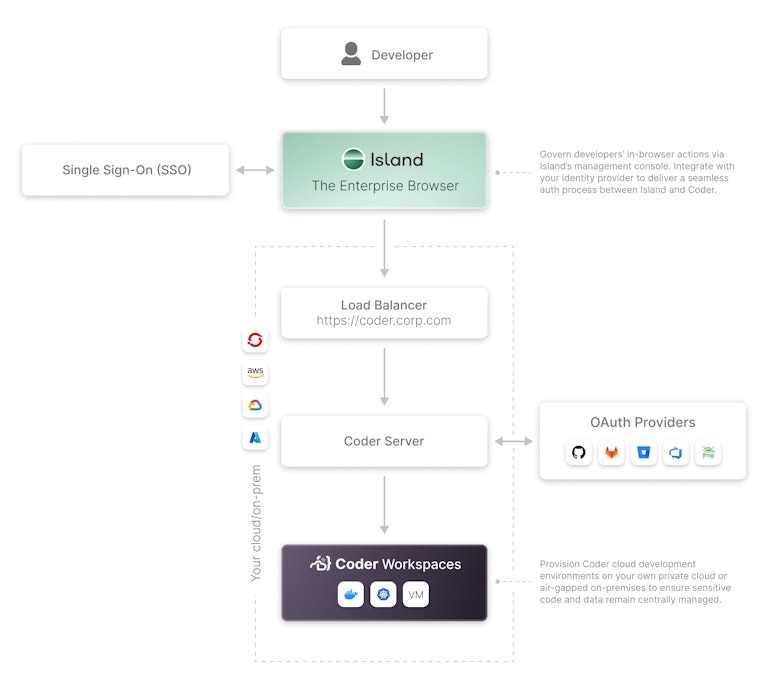CDEs + Enterprise Browsers: The Modern Alternative to VDI for Developers

Survival Depends on Developer Experience
No one gets fired for playing it safe. Relying on virtual desktop infrastructure to protect valuable IP? Safe bet. While no one is getting fired for choosing VDI, certain people aren’t sticking around for it. And those certain people are developers – the innovative lifeblood of any enterprise.
Developer experience has been an unintended casualty in organizations’ pursuit of security and governance. Sure, VDI satisfies security teams’ concerns, but it was never designed with software development use cases or developer experience in mind. As a result, developers’ path of least resistance is to opt out of VDI's poor developer experience for greener pastures.
For companies whose competitive advantages are predicated on innovation and speed to market, the impact of VDI on developer experience becomes more than an employee retention issue. It poses an existential threat. Satisfied developers are not just productive; they are innovative. It stands to reason that companies are focused on improving their developer experience, and VDI is increasingly under the microscope.
At last, there is a superior alternative to VDI for developers.
With the rise of cloud development environments, platform teams are centralizing developer workspaces in their cloud or on-premises while using enterprise browsers to solve last-mile security requirements that were previously only addressed through VDI. The natural confluence between cloud development environments and enterprise browsers delivers a modern alternative to VDI that platform, security, and development teams have long awaited, and with it, the potential to reduce virtual desktop licensing, infrastructure, and management costs by 90% or more.
There’s a Problem When Every Click Feels Like a Gamble
A lot has changed since VDI emerged in the early- to mid-2000s. Industries have been won and lost based on companies’ speed of innovation. No matter how razor-thin, any innovative advantage can decide whether a company dominates its landscape or fades into irrelevance.
Innovation begins with the developer. That’s why platform engineering teams are hyper-focused on improving their development teams’ quality of life. Their top priorities are automating frustrating toil and standardizing tools and environments. Reducing developers’ unnecessary cognitive load means they can focus more on solving business-critical problems.
An engineering lead described his experience with VDI, saying, “It’s like being stuck in a time warp where every click feels like a gamble.”
While hardly a comprehensive list, developers report the following as some of the most pervasive problems introduced by VDI:
- Laggy or unresponsive cursor movements and keystrokes impact the speed and accuracy with which developers operate. At best, their experience is frustrating and, at worst, a risk to quality and morale.
- Slow processing times from underscaled resources and network latency affect application execution and data retrieval, introducing another bottleneck and decelerating progress. Improper resource management can lead to one developer's demands degrading others' experiences.
- Tool compatibility conflicts arise because VDIs often run on Windows, while many development tools are designed for Linux distributions. This results in bugs being unknowingly shipped to different production environments and developers are left scrambling for hotfixes.
Today, security teams own VDI licenses that are old enough to drive, and platform teams are left wondering how to unravel their developer experience within VDI. What if they could completely sidestep the inherent limitations of legacy VDI without compromising security or access control? What if developers didn’t have to work within the confines of VDI at all?
This is the paradigm shift that we’re excited to introduce.
The Future of Software Development is Secure by Design
Now, a natural partnership between two world-class enterprise-grade technologies, born from necessity, promises a modern alternative to VDI for developers.
Together, Coder and Island deliver a premium developer experience that eliminates the core problems developers face while navigating legacy VDI. The best part for platform and security teams is that they can achieve this developer experience without compromising security or governance. Let’s unpack how Coder, a provider of self-hosted cloud development environments, and Island, the leading enterprise browser, unite to deliver an experience developers expect.
Coder is open source, runs air-gapped on-premises or in your cloud, and centralizes where developers work. Developers spin up their own cloud-based, ephemeral development environments in seconds, eliminating the need to spend days or weeks traversing outdated README files to provision local environments on their laptops. Coder cloud development environments are consistently provisioned as code and provide access to the IDEs, tools, and code your platform team pre-approves. Sensitive IP is accessed via web-based IDEs and never reaches developers’ laptops.
Island is an enterprise browser offering data protection unavailable in consumer-grade browsers. It’s the logical choice for enterprises that need to secure the last mile between developers and their Coder cloud development environments. Island is a Chromium-based browser that delivers a familiar experience while enforcing intelligent boundaries across all users, devices, apps, networks, and assets. Security teams can control everything that happens inside the browser, like preventing the copying and pasting of valuable source code to unsanctioned destinations or downloading and uploading files that contain sensitive data.

The resulting confluence between Coder and Island means that your source code and development environments remain centralized and in your control at all times. With Island’s browser-level data protection, what developers can do with that source code is simply a function of the policies you configure.
If ever there was a partnership between two class-leading technologies that posed a superior alternative to VDI, it’s this one. Now, enterprises can seriously reevaluate the future role VDI will play in securing valuable IP and governing how developers work. The outcome could be a win for everyone.
CDEs + Enterprise Browsers + Developers = Win-Win-Win
Many enterprise development organizations still view VDI as a permanent fixture in their daily lives. The decision to reduce or replace VDI is non-trivial.
However, with a viable modern VDI alternative now available, the most progressive and innovative companies are already seizing the opportunity to extend their edge or close competitive gaps through a better developer experience.
For developers, this means a faster, more predictable development process. They can use modern technology specifically designed for development tasks rather than outdated VDI technology never intended for software development. This shift enhances their productivity and reduces frustration and unnecessary toil.
And the benefits don’t end with developers.
Platform and security teams maintain the governance and control that originally made VDI appealing without relying on VDI. They deliver an exceptional developer experience, which is always a top priority for platform engineering teams, and they can do this without drowning in a flood of VDI-related tickets.
Finally, CISOs and CIOs see a massive reduction in VDI licensing and overhead costs—in some cases, 90% or more. They optimize operations around driving innovation and growth rather than supporting cumbersome VDI systems. Faster onboarding of new developers and contractors also means a faster time to market and a significant competitive edge without introducing more risk.
If you want to preview a future without VDI, drop us a note. We’re excited to share what the next-generation VDI alternative looks like and the opportunities it will unlock for your team.
Subscribe to our newsletter
Want to stay up to date on all things Coder? Subscribe to our monthly newsletter and be the first to know when we release new things!


